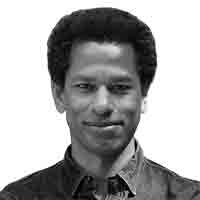In the movies the ability to rap must be earned—usually through combat and pressure. While the ability to sing is treated like a gift from the Gods, rappers have to make it by navigating the nine circles of Hell. Think of what Eminem’s B-Rabbit had to suffer through in 8 Mile in order to develop his talent and get just one shot to show it. On top of that, to make it as an MC you gotta have immense swag; your self-confidence has gotta be so thick it’s damn near tangible. Think of Terrence Howard’s DJay in Hustle & Flow. In hip-hop confidence is a crucial currency.
For so many hip-hop fans, what we want from artists is an infusion of confidence. KRS-One once told me rap songs are like “confidence sandwiches.” He said you put them in your mouth (by repeating the words in the cadence of the MC) and feel the self-assuredness and swagger that the MC himself felt, and it makes your own confidence swell. Hollywood loves characters powered by confidence. It loves to show us the rise of some small-town, salt of the earth person with talent who just needs a break to make it; a hero who rises from the muck on the strength of their unwavering self-belief (you know, the Rocky narrative). Hip-hop is the perfect stage for those stories since many of its biggest stars are actually living them.
Patti Cake$ is an extraordinary new film that follows that old formula—the hero, Patricia Dombrowski aka Killa P, is from the wrong side of the tracks, down on her luck and fighting to make it. We’ve seen that story a million times, yet this one still sent me out of the theater on a high.
ADVERTISEMENT
Patti (Danielle Macdonald) is an overweight white girl from New Jersey who gets no respect. She’s laughed at in the streets—her nickname is “Dumbo”—and dismissed at home by her mother Barb (Bridget Everett), who shouldn't be looking down on anyone. Mom spends a lot of time in dive bar bathrooms French-kissing toilets stained with her vomit, but I digress. Patti seems like the least likely hip-hop star ever—except when we see her in private, we see her faith in herself cannot be extinguished. She looks in the mirror and tells herself “you’re a boss bitch,” and has visions of being the biggest, baddest MC in the game. I interviewed Kanye for Rolling Stone right after his first album came out, when he was living in an apartment in New Jersey. He had a gigantic poster of himself on a wall and when I asked why he replied, “I’ve got to cheer for me before anyone else can.” I immediately noticed that was a really smart life tactic—he was imbuing himself with confidence at the moment he most needed it. It also sounded incredibly egotistical coming from the freshman rapper, but when Patti shows off her inner strength, it’s inspiring and makes it impossible not to root for her.
She’s poor white suburban trash in a fizzling New Jersey town where the bars have better attendance than the factories. Jersey’s a blue state but its margins are red, and Patti and most of those around her are reminiscent of the people we’ve been talking about endlessly since the election: white working class people who feel the world slipping away from them and are growing angry. So many people in that basket are studying Fox News, fearing the browning of America and its culture, and holding Blacks and immigrants responsible for their problems. But Patti’s crew consists of her clownish, adorable Indian best friend Hareesh (Siddharth Dhananjay, a YouTube rapper), Basterd, a Black punk rocker played by Mamoudou Athie who’s affect is so dark he makes Kurt Cobain look cheery, and her wheelchair-bound, chain-smoking grandma Nana (Cathy Moriarty). More than that, though, at a moment when many white people support Trump because they are afraid that their culture is being erased, Patti has embraced hip-hop entirely. She doesn’t think she’s an outsider because she’s white or that she needs someone’s permission to enter. She feels it’s her cultural birthright.
Indeed, hip-hop is so much hers that she becomes a barometer for realness. Hip-hop is constantly arguing about authenticity and cultural integrity: how real are you, or how honest is your presentation of yourself and your culture? Are you being real to yourself? In her world, the God of Hip-Hop is a famous rapper named O-Z who she dreams of being down with. To her, making it means being assimilated into his crew. Of course, with a name like Oz—and the green lights he’s bathed in—you know he’s going to fall far short of the grandiose image he’s laid out for himself. He’s a false idol. But more than that, he’s a symbol of a lack of integrity in hip-hop: the rich, overhyped, uber-famous stud who doesn’t truly care about the culture. And the divining rod is Patti. She cares far more about hip-hop integrity—about realness—than he does.
The movie would fall apart if her lyrics weren’t dope—why would we care what she’s fighting for?—but the fact is: Killa P can really rhyme. The songs were written by director Geremy Jasper and performed by Australian actress Danielle Macdonald after an intensive months-long rapper boot camp. Somehow it all works. If Killa P was a real MC the underground would be buzzing.





